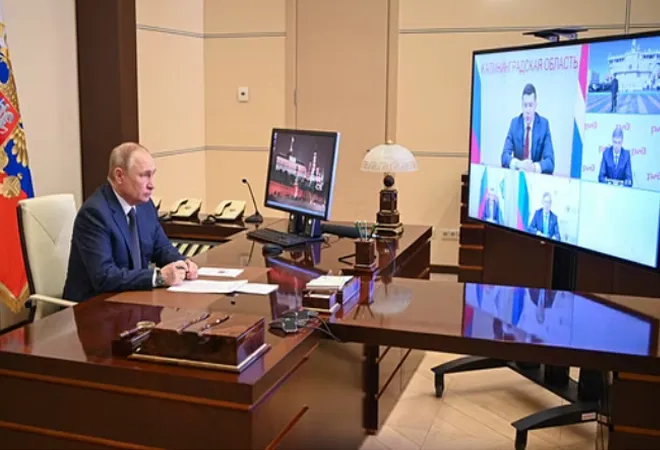-
CENTRES
Progammes & Centres
Location
The claims and counterclaims are less about the two protagonists in this war than it is about moulding the world’s opinion.

As Russia celebrates Victory Day this week, commemorating Russia’s victory over Nazi Germany, all eyes will be on Vladimir Putin’s speech at the Red Square.Giving these reports greater credibility, the leader of Russia's Wagner mercenary group, Yevgeny Prigozhin, targeted senior Russian defence officials in a rant, accusing them of ignoring the concerns of the fighters and declaring that he would withdraw his troops from Bakhmut as early as May 10 because of ammunition shortages. Though he signaled later on that Moscow had agreed to provide the supplies “needed to continue fighting” in the city, his outburst underscores the internal dysfunctionalities that continues to hamper Russian policymaking. As Russia celebrates Victory Day this week, commemorating Russia’s victory over Nazi Germany, all eyes will be on Vladimir Putin’s speech at the Red Square. It is likely to be on predictable lines as Putin has over the past few months tried to draw a direct line between Russian defeat of the Nazis and its war on Ukraine. Last year, Putin had thundered that the Russian army was fighting in Ukraine “so that there is no place in the world for butchers, murderers and Nazis” and predicted Russian victory. But there is a degree of nervousness in Russia this year, with several regions deciding to forego celebrations as concerns rise about the security in the country. The fact that drones could attack Kremlin in the heart of Moscow has induced caution and scare in the nation. Amid all the bravado on display in Moscow this week, with military parades and flamboyant speeches, it is far from clear if the perception of Russian military prowess remains intact after more than a year of war with Ukraine. A conflict that many in Moscow believed should have been over in a matter of weeks, if not days, shows no sign of coming to an end. Even its offensive that started in February has not yielded any significant dividends, even as the Ukrainian counter-offensive is awaited. Wars are easier to start but finding a way out is very hard. Putin is stuck with a conflict that he believes can be won by waiting a bit more as western patience crumbles and there is pressure on Ukraine to compromise. So far, most of Russian assumptions about this war have fallen by the wayside. For Ukraine and its western supporters, the stage for negotiations would come after Kyiv has a clear upper hand. As a consequence, both sides are trying to shape the battlefield to their advantage.
Putin is stuck with a conflict that he believes can be won by waiting a bit more as western patience crumbles and there is pressure on Ukraine to compromise.Some western nations have also pinned their hopes on China to bring about a negotiated end to the conflict. France has led this viewpoint and President Emmanuel Macron’s visit to China saw him making this point to Chinese leadership. Washington remains skeptical so far about Russia’s willingness to come to the negotiating table but has in principle not rejected off-hand the possibility of China playing an important role in peacemaking. There are growing concerns in Europe about its ability to continue to supply Ukraine with the military supplies that would be required in a protracted war. Yet, it is a divided Europe as of now with eastern European and Baltic nations still not in a mood for a compromise given the long-term stakes involved. The rest of the world, for sure, is getting impatient with the conflict and would welcome an early resolution. Large parts of the developing world are bearing the brunt of this conflict with serious food, fuel and fertiliser crises hampering the post-pandemic recovery. But dogs of war, once unleashed, are not easy to bring under control. It is now beyond Putin and Volodymyr Zelenskyy or even Xi Jinping and Joe Biden, to give closure to a conflict that has brought immeasurable suffering on all sides. As Bertrand Russell wrote long back: “War does not determine who is right, only who is left.”
The views expressed above belong to the author(s). ORF research and analyses now available on Telegram! Click here to access our curated content — blogs, longforms and interviews.

Professor Harsh V. Pant is Vice President – Studies and Foreign Policy at Observer Research Foundation, New Delhi. He is a Professor of International Relations ...
Read More +